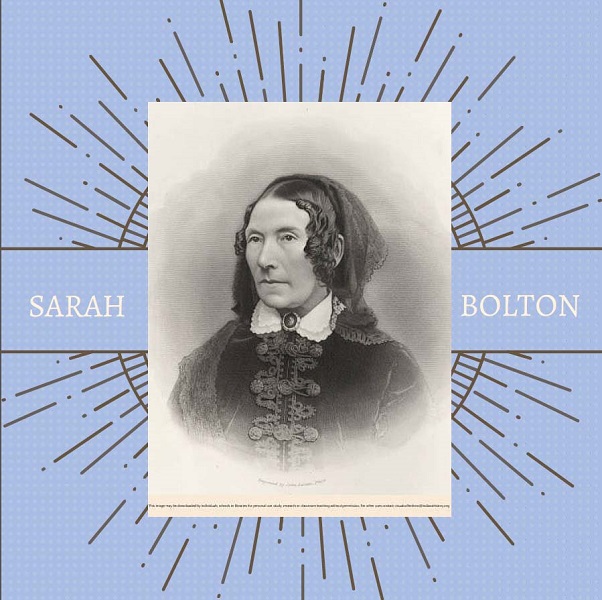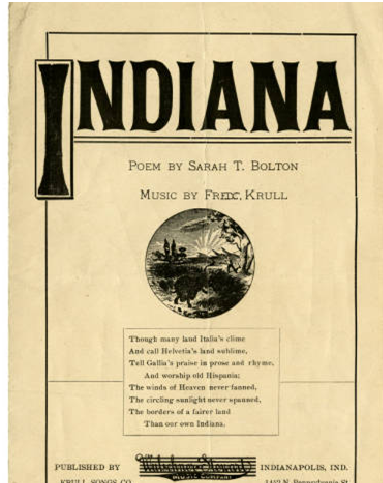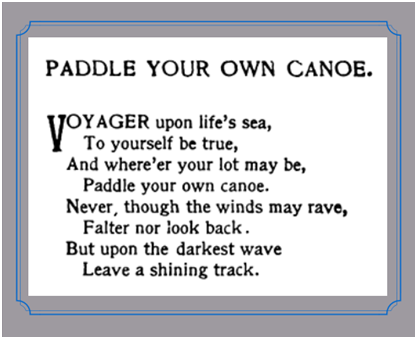
Women’s rights advocate, poet, and author of “Paddle Your Own Canoe” and “Indiana,” Sarah Tittle Barrett was born in Newport, Kentucky circa 1814. Commonly known as Sarah Bolton, she moved to Indiana as a young child, when much of the state was still unsettled. According to the Life and Poems of Sarah T. Bolton, while growing up on her family’s farm near Vernon, she was exposed to the pioneer experience, living in a log house and clearing the fields.
The Life and Poems of Sarah T. Bolton reports that she published her first poem in the Madison Banner when she was not yet fourteen and that she later wrote regularly for the papers of Madison and nearby Cincinnati. Bolton authored over 150 poems during her lifetime, many of which were featured in newspapers across the country. Her writings were included in numerous anthologies in the 1800s and 1900s, and several of the melodic verses were set to music, including Bolton’s “Indiana.”

In 1831, she married Indianapolis Gazette co-editor Nathaniel Bolton and the couple moved from Madison to Marion County, Indiana soon after. Between 1836 and 1845, they owned and operated a tavern, “Mt. Jackson,” on the National Road. In 1845, the Boltons sold their property to the State and it eventually became the site of the Indiana Hospital for the Insane, later renamed the Central State Hospital.* While in Indianapolis, Sarah’s poetry output continued to increase, and she wrote some of her most popular works there. She lived in the city for many years by the time she became involved in the women’s rights movement.

Bolton aided social reformer Robert Dale Owen in his fight for women’s rights of personal property in the 1850 State Constitutional Convention. Owen sought to add a provision to the new constitution that would allow women to retain control of their personal property after they entered into the contract of marriage. Bolton wrote letters to women across the state to build support for the movement, but Owen’s measure was voted down.
Bolton summarized her involvement in the effort to secure personal property rights for married women in a letter to William Wesley Woollen, stating:
“I was writing articles setting forth the grievances resulting from women’s status, as under the common law, and the necessity of reform and scattering these articles through the newspapers, over the state to make public opinion. At length the measure passed, but was reconsidered and voted down. Then we rallied the few women who were in favor of it and went to the Convention in a body to electioneer with the members. The measure was brought up and passed again, reconsidered the next day & again voted down. This, to the best of my recollection, was repeated five or six times before it was finally lost.”
In a July 6, 1851 letter to Bolton, Owen credited her efforts, stating “by dint of perseverance through many obstacles, you have so efficiently contributed to the good cause of the property rights of your sex.” Decades later Bolton reflected on her work, writing in 1882 “I am not a ‘woman’s rights woman’ in the common acceptation of the phrase. I have taken no part in the present crusade, but am proud of my action in that long ago battle for the property rights of my sisters.”

In 1855, Bolton’s husband was confirmed as Consul to Geneva, Switzerland, and she spent the next three years dividing her time between Missouri and Europe. She spent her final years, 1871-1893, at her home “Beech Bank” in the community of Beech Grove, focusing on her family and writing. Bolton died August 4, 1893 and was buried in Crown Hill Cemetery. The legacy of the “Hoosier poetess” endures through her poetry, such as “Paddle Your Own Canoe,” which has been translated into several languages and sung around the world.

Learn more about Sarah Bolton from the sources cited in this IHB report, and plan a visit to Bolton’s historical marker.
*IHB staff is currently conducting research for a Central State Hospital marker. Stay tuned to learn more!
